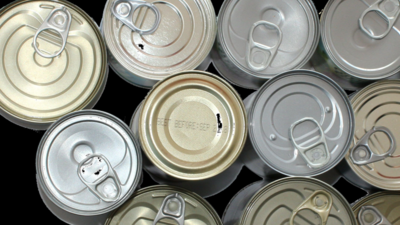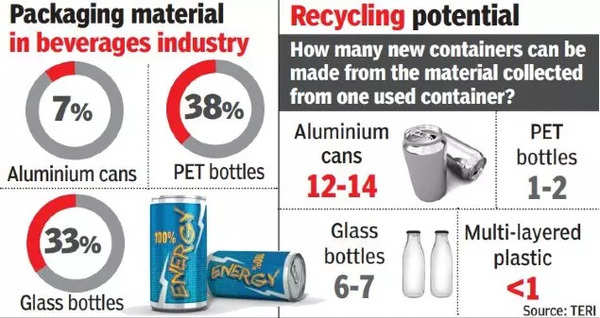Top Searches
- News
- City News
- bengaluru News
- Aluminium cans most sustainable: TERI study
Aluminium cans most sustainable: TERI study

Image used for representative purpose only
BENGALURU: A recent study by the Energy and Resources Institute (TERI) has concluded that aluminium cans are the most sustainable form of beverage packaging when compared to other packaging materials such as polyethylene terephthalate (PET), glass and multi-layer plastic (MLP).

Arguing that aluminium has tremendous potential for recycling, Souvik Bhattacharjya, associate director at TERI, said plastic is almost never 'recyclable' but is downcycled every time a used plastic item is reprocessed. This means that the quality of the material depreciates with every attempt at reusing and remoulding it, rendering it useless after 2-3 recycling processes. "However, aluminium doesn't have these restrictions and we found in our study that every aluminium can in the market consists of 78% recycled material," Bhattacharjya added.
According to the study, in comparison to a 500ml aluminium can, a 200ml PET bottle has 2.3 times more the potential to exacerbate global warming while a 200ml glass bottle is 4.2 times more harmful. Simply put, the environmental damage that one 200ml glass bottle can cause will be equal to approximately four 500ml aluminium cans.
The study has been funded and promoted by Ball Corporation, an aluminium-packaging solutions company, and the stakeholders of the work aim to realise their findings in the environment policies of the central and state governments. These findings have also been shared with the ministry of environment, forest and climate change by TERI and Ball.
Officials at Karnataka State Pollution Control Board (KSPCB) said they were aware of the presentation, but have a long way to go before incorporating any of TERI's findings into governing policiess.
Speaking to TOI about the goal to bring a mandate for beverage packaging, Amit Lahoti, regional general manager at Ball said: "We presented the results of our study to the chairperson of KSPCB and are looking at working with the government to holistically change the approach towards packaging and the sustainability aspect attached to it."
Most of the study was conducted using secondary data reportedly validated through primary consultation. Lahoti said although aluminium is costlier than plastic, its long-term benefit for a company's accounts' bottom line and sustainability goals is fruitful.
"With the material's recycling potential and the imposition of Plastic Waste Management (Amendment) Rules-2022, which include recycling and reusing targets for all plastic manufacturers, it would be profitable for corporations to switch to aluminium packaging while also being beneficial to environment," he said.

Arguing that aluminium has tremendous potential for recycling, Souvik Bhattacharjya, associate director at TERI, said plastic is almost never 'recyclable' but is downcycled every time a used plastic item is reprocessed. This means that the quality of the material depreciates with every attempt at reusing and remoulding it, rendering it useless after 2-3 recycling processes. "However, aluminium doesn't have these restrictions and we found in our study that every aluminium can in the market consists of 78% recycled material," Bhattacharjya added.
According to the study, in comparison to a 500ml aluminium can, a 200ml PET bottle has 2.3 times more the potential to exacerbate global warming while a 200ml glass bottle is 4.2 times more harmful. Simply put, the environmental damage that one 200ml glass bottle can cause will be equal to approximately four 500ml aluminium cans.
The study has been funded and promoted by Ball Corporation, an aluminium-packaging solutions company, and the stakeholders of the work aim to realise their findings in the environment policies of the central and state governments. These findings have also been shared with the ministry of environment, forest and climate change by TERI and Ball.
Officials at Karnataka State Pollution Control Board (KSPCB) said they were aware of the presentation, but have a long way to go before incorporating any of TERI's findings into governing policiess.
Speaking to TOI about the goal to bring a mandate for beverage packaging, Amit Lahoti, regional general manager at Ball said: "We presented the results of our study to the chairperson of KSPCB and are looking at working with the government to holistically change the approach towards packaging and the sustainability aspect attached to it."
Most of the study was conducted using secondary data reportedly validated through primary consultation. Lahoti said although aluminium is costlier than plastic, its long-term benefit for a company's accounts' bottom line and sustainability goals is fruitful.
"With the material's recycling potential and the imposition of Plastic Waste Management (Amendment) Rules-2022, which include recycling and reusing targets for all plastic manufacturers, it would be profitable for corporations to switch to aluminium packaging while also being beneficial to environment," he said.
FOLLOW US ON SOCIAL MEDIA
FacebookTwitterInstagramKOO APPYOUTUBE
Start a Conversation
end of article









